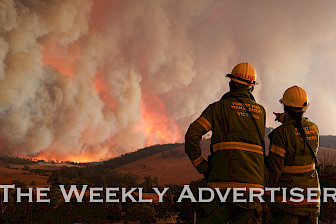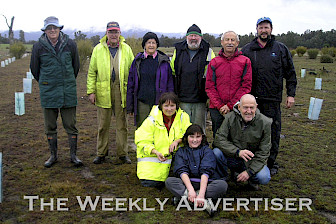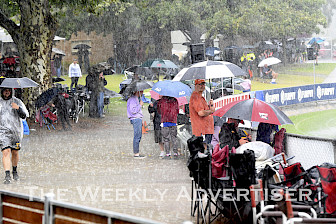Mr McCartney, a Wotjobaluk man with strong generational family connections to the region, said having a serious look at the potential of what types of bush food could be developed, cultivated and produced on various scales for domestic and international markets was a ‘no-brainer’.
“It just makes sense. We’re talking about produce that occurs naturally in the landscape and, while there is an important need to ensure the legal protection of the Wotjobaluk intellectual property, the scope for everyone in the Wimmera to share benefits in the space is considerable,” he said.
“Imagine, for example, if a farming business struggling with an exotic crop, historically and naturally unfamiliar with the landscape on one part of a property because of drought had, through a partnership or deal with Barengi Gadjin Land Council, an opportunity to produce valuable drought-proof alternatives?
“It is the ultimate value-adding scenario and would also represent a wonderful and productive cross-cultural collaboration.”
Serious consideration
Mr McCartney said general society had barely scratched the surface in understanding the natural plant food that indigenous communities had always tapped into and relied upon.
“It seems more than appropriate we seriously consider what this could mean, not only as a value-adding commodity exercise, but as a way to seriously contribute to caring for the country,” he said.
“In the Wimmera, home to the first Native Title claim in the state, the Wotjobaluk people, be it through generations and family teachings, have a deep connection with and understanding of this land.”
Mr McCartney said the concept was something in which the region could participate and benefit.
“We’re keen, when exploring endemic plant species and associated traditional history and culture and connections to the Wotjobaluk people, to look at how we might work collaboratively with Wimmera and southern Mallee private landowners in making this a reality,” he said.
“Of course at the moment we’re only talking about a concept in its infancy. There would need to be significant buy-in from various stakeholders, clear directives and processes, identification of market potential and demand and even alterations to some laws.
“But we can clearly see this as something with growth potential, not only for an industry, but also for the region and a pragmatic business approach to recognition, protection and respect of Wotjobaluk people’s knowledge and culture.”
Mr McCartney said the land council had been busy working, especially at its wholesale plant-production site at Wail Nursery, on identifying key market-demand species and undertaking various propagating, growing and harvesting techniques based on establishing commercial quantities.
“We’re planning to plant out a crop in the next 12 to 18 months to assess long-term opportunities,” he said.
“We’re looking at plants such as saltbush, quandong, yam daisy, chocolate lilies, native thyme, kangaroo grass and river mint.
“Most people in today’s agricultural environment wouldn’t have even heard of these plants in reference to food products, but the reality is that they have been in the human food chain for thousands of years in sustaining Wotjobaluk people.
“History tells us the contribution Aboriginal people have made to what Australia is today is often overlooked or swept under the carpet.
“We need only consider the contribution Indigenous soldiers made during world wars – while at the time not being recognised as Australian.
“A Wotjojbaluk-led bush-food industry would represent a pathway to collaboration and a respectful way of working towards a shared future.
“Having something unique and done the right way has many spin-off advantages, for example, bolstering the visitor economy.”
The entire July 1, 2020 edition of The Weekly Advertiser is available online. READ IT HERE!






